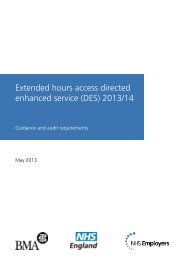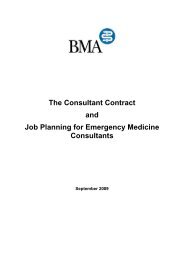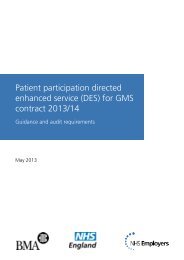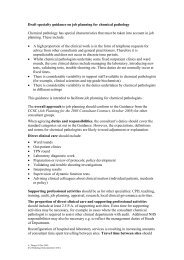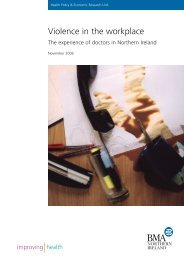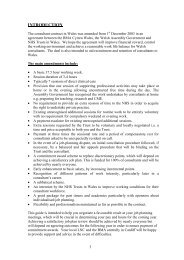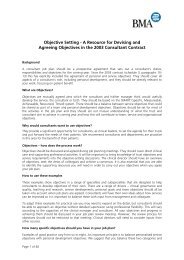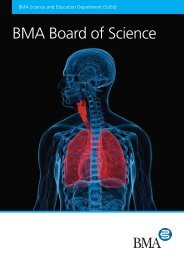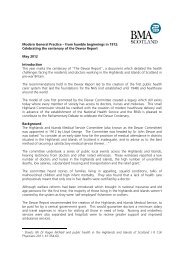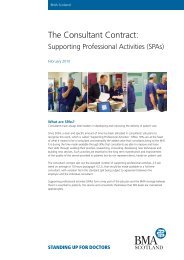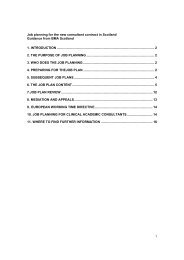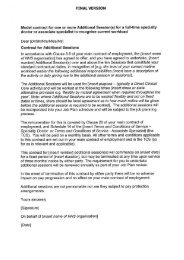What we know so far…Health and Social Care Act 2012 at a ... - BMA
What we know so far…Health and Social Care Act 2012 at a ... - BMA
What we know so far…Health and Social Care Act 2012 at a ... - BMA
Create successful ePaper yourself
Turn your PDF publications into a flip-book with our unique Google optimized e-Paper software.
<strong>BMA</strong> Parliamentary Unit<br />
<strong>Wh<strong>at</strong></strong> <strong>we</strong> <strong>know</strong> <strong>so</strong> far…<br />
Health <strong>and</strong> <strong>Social</strong><br />
<strong>Care</strong> <strong>Act</strong> <strong>2012</strong> <strong>at</strong><br />
a glance<br />
April <strong>2012</strong>
<strong>BMA</strong> Parliamentary Unit<br />
<strong>Wh<strong>at</strong></strong> <strong>we</strong> <strong>know</strong> <strong>so</strong> far…<br />
This paper forms part of a series of <strong>BMA</strong> briefing papers, which set out wh<strong>at</strong> <strong>we</strong> <strong>know</strong> <strong>so</strong> far on a<br />
range of key topics following the Government’s health reforms in Engl<strong>and</strong> 1<br />
.<br />
The Health <strong>and</strong> <strong>Social</strong> <strong>Care</strong> <strong>Act</strong> <strong>2012</strong>, which concluded its 15-month passage through Parliament on<br />
20 March <strong>2012</strong> <strong>and</strong> received Royal Assent on 27 March <strong>2012</strong>, now defines much of the Government’s<br />
policy in primary legisl<strong>at</strong>ion 2<br />
. The <strong>Act</strong> legisl<strong>at</strong>es for the NHS reforms first set out in the White Paper,<br />
Equity <strong>and</strong> Excellence: Liber<strong>at</strong>ing the NHS, which was published in July 2010.<br />
Following the legisl<strong>at</strong>ion’s passage through Parliament, a considerable amount of regul<strong>at</strong>ions <strong>and</strong><br />
further guidance is expected, providing detail on how the new <strong>Act</strong> will work in practice.<br />
This briefing paper focuses on bringing together the available facts <strong>and</strong> drawing <strong>at</strong>tention to gaps in<br />
<strong>know</strong>ledge r<strong>at</strong>her than giving an account of <strong>BMA</strong> policy. Further documents st<strong>at</strong>ing the <strong>BMA</strong>’s policies<br />
<strong>and</strong> positions are available <strong>at</strong> www.bma.org.uk/nhsreform.<br />
This paper provides a factual summary of the main changes to be effected by the new legisl<strong>at</strong>ion,<br />
covering the following areas:<br />
• Duties of the Secretary of St<strong>at</strong>e<br />
• New commissioning arrangements<br />
• Monitor, choice <strong>and</strong> competition<br />
• Found<strong>at</strong>ion Trusts<br />
• <strong>Care</strong> Quality Commission<br />
• N<strong>at</strong>ional Institute for Health <strong>and</strong> <strong>Care</strong> Excellence<br />
• Educ<strong>at</strong>ion, training <strong>and</strong> research<br />
• Public health<br />
• Local government<br />
• P<strong>at</strong>ient involvement<br />
• Inform<strong>at</strong>ion <strong>and</strong> confidentiality<br />
An overview of the health <strong>and</strong> <strong>so</strong>cial care structures envisaged by the legisl<strong>at</strong>ion can be found in the<br />
Annex.<br />
Contact us<br />
Health Policy <strong>and</strong> Economic Research Unit<br />
info.hperu@bma.org.uk<br />
<strong>BMA</strong> House, Tavistock Square, London, WC1H 9JP<br />
1 Other briefing notes in the series include: The NHS Commissioning Board; New Providers; Found<strong>at</strong>ion Trusts; Local<br />
Accountability; Choice <strong>and</strong> Any Qualified Provider; Monitor <strong>and</strong> Regul<strong>at</strong>ion. These briefing notes are available <strong>at</strong><br />
www.bma.org.uk/nhsreform<br />
2 The Health <strong>and</strong> <strong>Social</strong> <strong>Act</strong> <strong>2012</strong> is available <strong>at</strong> www.legisl<strong>at</strong>ion.gov.uk/ukpga/<strong>2012</strong>/7/pdfs/ukpga_<strong>2012</strong>0007_en.pdf<br />
<strong>Wh<strong>at</strong></strong> <strong>we</strong> <strong>know</strong> <strong>so</strong> <strong>far…Health</strong> <strong>and</strong> <strong>Social</strong> <strong>Care</strong> <strong>Act</strong> <strong>2012</strong> <strong>at</strong> a glance 1
2<br />
<strong>BMA</strong> Parliamentary Unit<br />
Main policy areas<br />
Duties of the Secretary of St<strong>at</strong>e<br />
• The <strong>Act</strong> places duties on the Secretary of St<strong>at</strong>e for Health to promote a comprehensive health<br />
service in Engl<strong>and</strong> <strong>and</strong> al<strong>so</strong> to promote autonomy. The <strong>Act</strong> outlines th<strong>at</strong> the Secretary of St<strong>at</strong>e<br />
retains ministerial responsibility to Parliament for the provision of the health service in Engl<strong>and</strong> <strong>and</strong><br />
explains th<strong>at</strong> the duty to promote a comprehensive health service will take priority over the duty to<br />
promote autonomy should they conflict.<br />
• The <strong>Act</strong> al<strong>so</strong> places duties on the Secretary of St<strong>at</strong>e to: act to secure improvement in the quality of<br />
services; have regard to the need to reduce health inequalities; promote research on areas relevant<br />
to the health service <strong>and</strong> the use of evidence within the health service; promote equality of<br />
provision; ensure th<strong>at</strong> there is an effective system for the planning <strong>and</strong> delivery of educ<strong>at</strong>ion <strong>and</strong><br />
training; protect public health. The Secretary of St<strong>at</strong>e al<strong>so</strong> has po<strong>we</strong>rs of intervention in rel<strong>at</strong>ion to<br />
failure by various bodies connected with the health service.<br />
• The <strong>Act</strong> enables the Secretary of St<strong>at</strong>e to set priorities for the NHS through a m<strong>and</strong><strong>at</strong>e for the NHS<br />
Commissioning Board. The Secretary of St<strong>at</strong>e al<strong>so</strong> has regul<strong>at</strong>ion-making po<strong>we</strong>rs outlining<br />
requirements for NHS commissioners.<br />
New commissioning arrangements<br />
• The <strong>Act</strong> establishes the NHS Commissioning Board <strong>and</strong> it will be accountable to the Secretary<br />
of St<strong>at</strong>e for meeting the requirements outlined in the m<strong>and</strong><strong>at</strong>e. The m<strong>and</strong><strong>at</strong>e will be subjected<br />
to consult<strong>at</strong>ion, public<strong>at</strong>ion <strong>and</strong> consider<strong>at</strong>ion in Parliament. The <strong>Act</strong> al<strong>so</strong> establishes Clinical<br />
Commissioning Groups (CCGs) to be responsible for commissioning local services. Str<strong>at</strong>egic Health<br />
Authorities (SHAs) <strong>and</strong> Primary <strong>Care</strong> Trusts (PCTs) will be abolished by April 2013. The Board will<br />
become a full st<strong>at</strong>utory body in October <strong>2012</strong> <strong>and</strong> most CCGs are expected to be authorised by<br />
April 2013.<br />
• The <strong>Act</strong> places various shared duties on the Board <strong>and</strong> CCGs including: promoting the NHS<br />
Constitution; ensuring effectiveness <strong>and</strong> efficiency; securing continuous improvements in the quality<br />
of services commissioned; reducing inequalities; enabling choice; promoting p<strong>at</strong>ient involvement;<br />
securing integr<strong>at</strong>ion; promoting educ<strong>at</strong>ion <strong>and</strong> training, innov<strong>at</strong>ion <strong>and</strong> research.<br />
• The Board al<strong>so</strong> has specific duties including: promoting autonomy; ensuring regard to impact on<br />
services in certain areas (i.e. to have regard to the possible consequences of its commissioning<br />
decisions on the provision of health services to those living in areas of Scotl<strong>and</strong> or Wales close to the<br />
English border); avoidance of vari<strong>at</strong>ion in provision of health services (the Board must not, as part of<br />
its functions, set out to vary the proportion of services delivered by providers due to their st<strong>at</strong>us, i.e.<br />
public or priv<strong>at</strong>e sector).<br />
• CCGs <strong>and</strong> the Board are required to obtain advice from a people with ‘a broad range of professional<br />
expertise.’ In undertaking this, input can be <strong>so</strong>ught from clinical sen<strong>at</strong>es <strong>and</strong> clinical networks<br />
(although these bodies are not mentioned in the <strong>Act</strong>). The <strong>Act</strong> al<strong>so</strong> calls for close working with<br />
Health <strong>and</strong> Wellbeing Boards.<br />
• The Board will oversee CCGs <strong>and</strong> they will be financially accountable to it. The Board will al<strong>so</strong><br />
provide guidance <strong>and</strong> advice to CCGs.<br />
<strong>Wh<strong>at</strong></strong> <strong>we</strong> <strong>know</strong> <strong>so</strong> <strong>far…Health</strong> <strong>and</strong> <strong>Social</strong> <strong>Care</strong> <strong>Act</strong> <strong>2012</strong> <strong>at</strong> a glance
<strong>BMA</strong> Parliamentary Unit<br />
• Authoris<strong>at</strong>ion of a CCG by the Board will only be possible if certain criteria are met (e.g. th<strong>at</strong> it has:<br />
the means to undertake commissioning responsibilities; an accountable officer; a governing body<br />
with lay <strong>and</strong> wider clinical membership; a constitution which outlines processes for decision-making,<br />
accountability <strong>and</strong> dealing with any conflicts of interest).<br />
• In order to achieve authoris<strong>at</strong>ion, CCGs will have to demonstr<strong>at</strong>e th<strong>at</strong> they have access to adequ<strong>at</strong>e<br />
commissioning support services (including back office functions such as payroll as <strong>we</strong>ll as more<br />
complex services such as d<strong>at</strong>a g<strong>at</strong>hering <strong>and</strong> analysis to inform the commissioning process).<br />
• The <strong>Act</strong> introduces a ‘quality reward’ intended to recognise CCGs <strong>and</strong> practices within it in order to<br />
incentivise high-quality commissioning. Details of this reward will be fleshed out in secondary<br />
legisl<strong>at</strong>ion.<br />
Monitor, choice <strong>and</strong> competition<br />
• Monitor will be the economic regul<strong>at</strong>or for all NHS funded services. All providers of NHS healthcare<br />
services, unless exempted, will need to hold a licence with Monitor, which will maintain <strong>and</strong> publish<br />
a register of licence holders. It will be able to set different conditions for different types of licences,<br />
depending on the services provided or the areas in which services are delivered. Conditions are likely<br />
to include a requirement to pay fees, to provide Monitor with inform<strong>at</strong>ion considered necessary for<br />
price setting, <strong>and</strong> to do, or not do, specified things to prevent anti-competitive behaviour which acts<br />
against the interests of p<strong>at</strong>ients.<br />
• The Secretary of St<strong>at</strong>e will have the po<strong>we</strong>r to exempt <strong>so</strong>me individuals, groups of providers or<br />
certain types of health services from Monitor’s licensing requirements.<br />
• Monitor will not be permitted to set or modify licence conditions for the purpose of promoting<br />
competition or to encourage the growth of the priv<strong>at</strong>e sector over existing st<strong>at</strong>e providers, or<br />
vice versa. It will have po<strong>we</strong>rs to set <strong>and</strong> enforce licence conditions to enable integr<strong>at</strong>ion <strong>and</strong><br />
cooper<strong>at</strong>ion bet<strong>we</strong>en healthcare providers.<br />
• In order to address anti-competitive behaviour in areas where choice <strong>and</strong> competition already<br />
oper<strong>at</strong>e, Monitor will have concurrent functions with the Office of Fair Trading (OFT). Monitor will<br />
work with the NHS Commissioning Board to set out guidance on how choice <strong>and</strong> competition<br />
should be applied to particular services.<br />
• Monitor will be required to exercise its functions with a view to enabling services to be provided in<br />
an integr<strong>at</strong>ed way, where this would improve quality or efficiency, or reduce inequality of access or<br />
outcome for p<strong>at</strong>ients. This is aimed <strong>at</strong> strengthening collabor<strong>at</strong>ion <strong>and</strong> integr<strong>at</strong>ion where it is in the<br />
interests of p<strong>at</strong>ients.<br />
• Monitor will have various duties around price setting, including developing st<strong>and</strong>ardised pricing<br />
currencies for the n<strong>at</strong>ional tariff, with the NHS Commissioning Board.<br />
• Monitor will al<strong>so</strong> have po<strong>we</strong>rs to assist providers in significant difficulty. This will include requiring<br />
a provider to appoint a turnaround expert to help them avoid failure <strong>and</strong> appointing a continuity<br />
administr<strong>at</strong>or to take control of a provider’s affairs when it is deemed clinically or financially<br />
unsustainable.<br />
<strong>Wh<strong>at</strong></strong> <strong>we</strong> <strong>know</strong> <strong>so</strong> <strong>far…Health</strong> <strong>and</strong> <strong>Social</strong> <strong>Care</strong> <strong>Act</strong> <strong>2012</strong> <strong>at</strong> a glance 3
4<br />
<strong>BMA</strong> Parliamentary Unit<br />
• Monitor will al<strong>so</strong> have a duty to cre<strong>at</strong>e a ‘risk pool’ for struggling providers to access funds to help<br />
them tackle their problems.<br />
• Monitor will retain specific oversight po<strong>we</strong>rs over all Found<strong>at</strong>ion Trusts (FTs) until 2016, to try to<br />
provide continuity <strong>and</strong> enable governors to build capacity in holding their boards to account. The<br />
ultim<strong>at</strong>e intention is for FTs to manage their own governance <strong>and</strong> financial performance, without<br />
oversight. Monitor will perform the role of registrar of FTs. For this purpose, a number of enduring<br />
conditions will apply to FTs on a perpetual basis with the aim of ensuring a level playing field for<br />
all providers.<br />
Found<strong>at</strong>ion Trusts<br />
• While the original deadline of April 2014 for all trusts to become FTs has been removed from the<br />
Government’s proposals, the <strong>Act</strong> still allows for the Secretary of St<strong>at</strong>e to bring in the provision to<br />
abolish all remaining NHS Trusts <strong>at</strong> a future d<strong>at</strong>e of his/her choosing. The NHS Trust Development<br />
Authority (which does not appear in the legisl<strong>at</strong>ion) is to be established in summer <strong>2012</strong>. The<br />
Government says th<strong>at</strong> the Authority will ‘provide governance <strong>and</strong> oversight of NHS Trusts following<br />
the abolition of SHAs in 2013.’ Included in its remit is performance management of NHS Trusts,<br />
financial scrutiny <strong>and</strong> po<strong>we</strong>rs of intervention if NHS Trusts are deemed to be poorly performing.<br />
• The Department of Health’s expect<strong>at</strong>ion is th<strong>at</strong> the vast majority of NHS Trusts will have achieved FT<br />
st<strong>at</strong>us by 2014. The <strong>Act</strong> al<strong>so</strong> exempts trusts th<strong>at</strong> have entered into ‘franchise arrangements’ from<br />
having to achieve FT st<strong>at</strong>us for the dur<strong>at</strong>ion of those arrangements, <strong>and</strong> for three years after the<br />
arrangements have ended.<br />
• FTs are given gre<strong>at</strong>er scope to gener<strong>at</strong>e priv<strong>at</strong>e income although they will have to ensure th<strong>at</strong> the<br />
majority of their income is through NHS services (this by default sets the priv<strong>at</strong>e p<strong>at</strong>ient income cap<br />
<strong>at</strong> 49%). An increase in the proportion of an FT’s priv<strong>at</strong>e income of more than 5% would need<br />
majority approval by its governors <strong>and</strong> FTs will be required to document how non-NHS income has<br />
benefited NHS services in their annual reports.<br />
• The legisl<strong>at</strong>ion al<strong>so</strong> sets out the arrangements for FTs undergoing organis<strong>at</strong>ional change in the event<br />
of mergers, acquisitions, separ<strong>at</strong>ions <strong>and</strong> dis<strong>so</strong>lutions.<br />
<strong>Care</strong> Quality Commission<br />
• The <strong>Care</strong> Quality Commission (CQC) will continue to act as the quality inspector<strong>at</strong>e across health<br />
<strong>and</strong> <strong>so</strong>cial care. The <strong>Act</strong> removes the CQC’s responsibility for assessing the performance of NHS<br />
commissioners, which will be taken on by the NHS Commissioning Board, <strong>and</strong> for carrying out<br />
periodic reviews of NHS services. It is hoped th<strong>at</strong> this will allow the CQC to focus its re<strong>so</strong>urces on<br />
its core role of registering <strong>and</strong> regul<strong>at</strong>ing providers. The Government says th<strong>at</strong> the CQC’s remit is<br />
distinct from Monitor in th<strong>at</strong> its focus will be on quality; it registers health <strong>and</strong> adult <strong>so</strong>cial care<br />
services to ensure quality st<strong>and</strong>ards <strong>and</strong> maintains inspections to make sure those st<strong>and</strong>ards<br />
continue to be met.<br />
• Under the new joint licensing regime, the CQC will be responsible for licensing NHS <strong>and</strong> adult <strong>so</strong>cial<br />
care providers against essential safety <strong>and</strong> quality requirements. It is likely th<strong>at</strong> the CQC will continue<br />
to oper<strong>at</strong>e its existing licensing scheme; there have not been any changes announced to d<strong>at</strong>e.<br />
<strong>Wh<strong>at</strong></strong> <strong>we</strong> <strong>know</strong> <strong>so</strong> <strong>far…Health</strong> <strong>and</strong> <strong>Social</strong> <strong>Care</strong> <strong>Act</strong> <strong>2012</strong> <strong>at</strong> a glance
<strong>BMA</strong> Parliamentary Unit<br />
• The CQC will continue to inspect providers against the essential levels of safety <strong>and</strong> quality. It will<br />
carry out inspections in response to inform<strong>at</strong>ion th<strong>at</strong> it receives about a provider, which will now<br />
come through CCGs <strong>and</strong> local HealthW<strong>at</strong>ch <strong>and</strong> HealthW<strong>at</strong>ch Engl<strong>and</strong>, as <strong>we</strong>ll as the already<br />
established channels, such as p<strong>at</strong>ient <strong>and</strong> service user feedback <strong>and</strong> complaints.<br />
N<strong>at</strong>ional Institute for Health <strong>and</strong> <strong>Care</strong> Excellence<br />
• The N<strong>at</strong>ional Institute for Health <strong>and</strong> Clinical Excellence (NICE) will largely remain the same but,<br />
under the <strong>Act</strong>, it will become a Non-Departmental Public Body. NICE’s role will still continue to<br />
consider evidence in order to make recommend<strong>at</strong>ions on medicines, tre<strong>at</strong>ments <strong>and</strong> procedures.<br />
• Its remit will be extended to include <strong>so</strong>cial care <strong>and</strong> its name will change to the N<strong>at</strong>ional Institute<br />
for Health <strong>and</strong> <strong>Care</strong> Excellence although the acronym, NICE, will still be retained.<br />
Educ<strong>at</strong>ion, training <strong>and</strong> research<br />
• The <strong>Act</strong> places a duty on the Secretary of St<strong>at</strong>e to exercise his/her functions to secure an effective<br />
system for the planning <strong>and</strong> delivery of educ<strong>at</strong>ion <strong>and</strong> training for healthcare workers.<br />
• There are al<strong>so</strong> duties on the NHS Commissioning Board <strong>and</strong> CCGs to have regard to the need to<br />
promote educ<strong>at</strong>ion <strong>and</strong> training in carrying out their functions; <strong>and</strong> a duty to ensure th<strong>at</strong><br />
commissioning arrangements for health services secure th<strong>at</strong> providers co-oper<strong>at</strong>e with the Secretary<br />
of St<strong>at</strong>e in the discharge of his/her duty to educ<strong>at</strong>ion <strong>and</strong> training.<br />
• Although not mentioned in the <strong>Act</strong>, Health Educ<strong>at</strong>ion Engl<strong>and</strong> (HEE) will be established as a<br />
Special Health Authority in June <strong>2012</strong>. Among its functions will be promotion of high quality<br />
educ<strong>at</strong>ion <strong>and</strong> training as <strong>we</strong>ll as authorising <strong>and</strong> supporting Local Educ<strong>at</strong>ion <strong>and</strong> Training<br />
Boards (LETBs). It is expected th<strong>at</strong> the educ<strong>at</strong>ion <strong>and</strong> training functions of SHAs <strong>and</strong> postgradu<strong>at</strong>e<br />
deaneries will be undertaken by LETBs. The Government has indic<strong>at</strong>ed th<strong>at</strong> further legisl<strong>at</strong>ion will<br />
follow on educ<strong>at</strong>ion <strong>and</strong> training.<br />
• The <strong>Act</strong> al<strong>so</strong> seeks to provide the legal basis for research in the NHS <strong>and</strong> places duties on the<br />
Secretary of St<strong>at</strong>e, the NHS Commissioning Board <strong>and</strong> CCGs to promote research. Monitor is al<strong>so</strong><br />
required to have regard to the need to promote research into m<strong>at</strong>ters relevant to the NHS by those<br />
providing healthcare services for the purposes of the NHS. The Government has al<strong>so</strong> confirmed th<strong>at</strong><br />
it will establish the Health Research Authority (HRA) as a Special Health Authority with future<br />
legisl<strong>at</strong>ion to make it a Non-Departmental Public Body.<br />
Public health<br />
• The <strong>Act</strong> restructures public health services n<strong>at</strong>ionally <strong>and</strong> locally. N<strong>at</strong>ionally, the <strong>Act</strong> places a duty<br />
on the Secretary of St<strong>at</strong>e to protect the people of Engl<strong>and</strong>, with central responsibility for health<br />
protection <strong>and</strong> response to emergencies. Although not mentioned in the <strong>Act</strong>, a new executive<br />
agency, Public Health Engl<strong>and</strong>, will be the n<strong>at</strong>ional body overseeing the public health system<br />
<strong>and</strong> will be accountable to the Secretary of St<strong>at</strong>e.<br />
• Locally, the <strong>Act</strong> grants local authorities responsibilities for health <strong>and</strong> stipul<strong>at</strong>es th<strong>at</strong> they must<br />
employ a Director of Public Health. The local authority must have regard to any guidance given by<br />
the Secretary of St<strong>at</strong>e in rel<strong>at</strong>ion to its Director of Public Health, including guidance on appointment,<br />
termin<strong>at</strong>ion of appointment <strong>and</strong> terms <strong>and</strong> conditions of management.<br />
<strong>Wh<strong>at</strong></strong> <strong>we</strong> <strong>know</strong> <strong>so</strong> <strong>far…Health</strong> <strong>and</strong> <strong>Social</strong> <strong>Care</strong> <strong>Act</strong> <strong>2012</strong> <strong>at</strong> a glance 5
6<br />
<strong>BMA</strong> Parliamentary Unit<br />
• Directors of Public Health have been added to the list of st<strong>at</strong>utory chief officers in the Local<br />
Government <strong>and</strong> Housing <strong>Act</strong> 1989 to establish parity with other chief officers in local government<br />
such as Directors of Adult <strong>Social</strong> Services <strong>and</strong> Directors of Children’s Services.<br />
Local government<br />
• The <strong>Act</strong> introduces new Health <strong>and</strong> Wellbeing Boards to each upper tier local authority. Health<br />
<strong>and</strong> Wellbeing Boards will have a duty to encourage integr<strong>at</strong>ed commissioning bet<strong>we</strong>en health,<br />
<strong>so</strong>cial care <strong>and</strong> public health by bringing together represent<strong>at</strong>ives of these sectors.<br />
• The boards will be tasked with: leading on the Joint Str<strong>at</strong>egic Needs Assessment; developing a new<br />
joint health <strong>and</strong> <strong>we</strong>llbeing str<strong>at</strong>egy to inform local commissioning plans; developing agreements to<br />
pool budgets.<br />
• The Health <strong>and</strong> Wellbeing Board will include: the Director of Adult <strong>Social</strong> Services, the Director of<br />
Children’s Services, the Director of Public Health, a represent<strong>at</strong>ive of each CCG, a represent<strong>at</strong>ive of<br />
local HealthW<strong>at</strong>ch <strong>and</strong> as many local councillors as they choose. It will be accountable to the local<br />
authority’s Overview <strong>and</strong> Scrutiny Committee.<br />
P<strong>at</strong>ient involvement<br />
• Duties have been placed on the NHS Commissioning Board, CCGs, Monitor <strong>and</strong> Health <strong>and</strong><br />
Wellbeing Boards to involve p<strong>at</strong>ients, carers <strong>and</strong> the public. New p<strong>at</strong>ient <strong>and</strong> public bodies, <strong>know</strong>n<br />
as local HealthW<strong>at</strong>ch will be established. Local HealthW<strong>at</strong>ch will act as a point of contact for<br />
individuals, community groups <strong>and</strong> voluntary organis<strong>at</strong>ions when dealing with health <strong>and</strong> <strong>so</strong>cial care<br />
<strong>and</strong> will have a represent<strong>at</strong>ive se<strong>at</strong> on the Health <strong>and</strong> Wellbeing Board. HealthW<strong>at</strong>ch will be<br />
commissioned by the local authority <strong>and</strong> held to account by the local authority’s Overview <strong>and</strong><br />
Scrutiny Committee.<br />
• A n<strong>at</strong>ional body, HealthW<strong>at</strong>ch Engl<strong>and</strong>, will be established to support local HealthW<strong>at</strong>ch. It will sit as<br />
a st<strong>at</strong>utory committee of the CQC. HealthW<strong>at</strong>ch Engl<strong>and</strong> will be tasked with representing people<br />
using health services <strong>at</strong> a n<strong>at</strong>ional level <strong>and</strong> will have a role in advising CQC to review services where<br />
appropri<strong>at</strong>e.<br />
• CCGs will have a st<strong>at</strong>utory duty to have regard to the Joint Str<strong>at</strong>egic Needs Assessment <strong>and</strong> joint<br />
health <strong>and</strong> <strong>we</strong>llbeing str<strong>at</strong>egy. CCGs will al<strong>so</strong> be represented on the Health <strong>and</strong> Wellbeing Board.<br />
Inform<strong>at</strong>ion <strong>and</strong> confidentiality<br />
• The <strong>Act</strong> enables the Health <strong>and</strong> <strong>Social</strong> <strong>Care</strong> Inform<strong>at</strong>ion Centre to be the central point for<br />
inform<strong>at</strong>ion collected from NHS <strong>and</strong> <strong>so</strong>cial care organis<strong>at</strong>ions in Engl<strong>and</strong>. The Inform<strong>at</strong>ion Centre<br />
will publish a code of practice for health or <strong>so</strong>cial care bodies (or those providing health or <strong>so</strong>cial<br />
care) on how to deal with p<strong>at</strong>ient-identifiable or other confidential inform<strong>at</strong>ion.<br />
<strong>Wh<strong>at</strong></strong> <strong>we</strong> <strong>know</strong> <strong>so</strong> <strong>far…Health</strong> <strong>and</strong> <strong>Social</strong> <strong>Care</strong> <strong>Act</strong> <strong>2012</strong> <strong>at</strong> a glance
<strong>BMA</strong> Parliamentary Unit<br />
Glossary<br />
• <strong>Care</strong> Quality Commission (CQC) – The CQC will continue to act as the quality inspector<strong>at</strong>e across<br />
health <strong>and</strong> <strong>so</strong>cial care. The new <strong>Act</strong> removes the CQC’s responsibility for assessing the performance<br />
of NHS commissioners, which will be taken on by the NHS Commissioning Board, <strong>and</strong> for carrying<br />
out periodic reviews of NHS services.<br />
• Clinical Commissioning Groups (CCGs) – GP practices have formed CCGs in prepar<strong>at</strong>ion for the<br />
formal establishment of CCGs as st<strong>at</strong>utory commissioning bodies from April 2013.<br />
• Clinical sen<strong>at</strong>es <strong>and</strong> clinical networks – Clinical networks will be condition or service area<br />
specific, <strong>and</strong> clinical sen<strong>at</strong>es ‘are intended to bring together a range of experts, professionals <strong>and</strong><br />
others from across different areas of health <strong>and</strong> <strong>so</strong>cial care to offer access to independent advice<br />
about improvements in quality of care across broad geographical areas of the country’ 3<br />
. Both<br />
sen<strong>at</strong>es <strong>and</strong> networks are intended to pool specialist expertise <strong>and</strong> thereby support the work of<br />
CCGs <strong>and</strong> will be hosted by the NHS Commissioning Board.<br />
• Health <strong>and</strong> <strong>Social</strong> <strong>Care</strong> Inform<strong>at</strong>ion Centre – The Health <strong>and</strong> <strong>Social</strong> <strong>Care</strong> Inform<strong>at</strong>ion Centre will<br />
be the central point for inform<strong>at</strong>ion collected from NHS <strong>and</strong> <strong>so</strong>cial care organis<strong>at</strong>ions in Engl<strong>and</strong>.<br />
• Health <strong>and</strong> Wellbeing Boards – Health <strong>and</strong> Wellbeing Boards will have a duty to encourage<br />
integr<strong>at</strong>ed commissioning bet<strong>we</strong>en health, <strong>so</strong>cial care <strong>and</strong> public health by bringing together<br />
represent<strong>at</strong>ives of these sectors.<br />
• Health Educ<strong>at</strong>ion Engl<strong>and</strong> (HEE) – HEE will be established as a Special Health Authority in June<br />
<strong>2012</strong>. Among its functions will be to promote high quality educ<strong>at</strong>ion <strong>and</strong> training. It will al<strong>so</strong><br />
authorise <strong>and</strong> support Local Educ<strong>at</strong>ion <strong>and</strong> Training Boards (LETBs).<br />
• Health Research Authority (HRA) – The HRA will be a new organis<strong>at</strong>ion to oversee the<br />
governance <strong>and</strong> regul<strong>at</strong>ion of health research.<br />
• HealthW<strong>at</strong>ch Engl<strong>and</strong> – HealthW<strong>at</strong>ch Engl<strong>and</strong> will be established to support local HealthW<strong>at</strong>ch. It<br />
will sit as a st<strong>at</strong>utory committee of the CQC. HealthW<strong>at</strong>ch Engl<strong>and</strong> will be tasked with representing<br />
people using health services <strong>at</strong> a n<strong>at</strong>ional level <strong>and</strong> will have a role in advising CQC to review<br />
services where appropri<strong>at</strong>e.<br />
• Local Educ<strong>at</strong>ion <strong>and</strong> Training Boards (LETBs) – It is expected th<strong>at</strong> the current educ<strong>at</strong>ion <strong>and</strong><br />
training functions of SHAs <strong>and</strong> postgradu<strong>at</strong>e deaneries will be undertaken by LETBs.<br />
• Local HealthW<strong>at</strong>ch – Local HealthW<strong>at</strong>ch will act as a point of contact for individuals, community<br />
groups <strong>and</strong> voluntary organis<strong>at</strong>ions when dealing with health <strong>and</strong> <strong>so</strong>cial care <strong>and</strong> will have a<br />
represent<strong>at</strong>ive se<strong>at</strong> on the Health <strong>and</strong> Wellbeing Board.<br />
• Monitor – Monitor will be the economic regul<strong>at</strong>or for all NHS funded services. All providers of NHS<br />
healthcare services, unless exempted, will need to hold a licence with Monitor, which will maintain<br />
<strong>and</strong> publish a register of licence holders.<br />
3 Department of Health (2011) Developing clinical sen<strong>at</strong>es <strong>and</strong> networks (Dear colleague letter from K<strong>at</strong>hy McLean, 15 September 2011)<br />
<strong>Wh<strong>at</strong></strong> <strong>we</strong> <strong>know</strong> <strong>so</strong> <strong>far…Health</strong> <strong>and</strong> <strong>Social</strong> <strong>Care</strong> <strong>Act</strong> <strong>2012</strong> <strong>at</strong> a glance 7
8<br />
<strong>BMA</strong> Parliamentary Unit<br />
• N<strong>at</strong>ional Institute for Health <strong>and</strong> <strong>Care</strong> Excellence (NICE) – NICE’s remit will largely remain the<br />
same but under the new <strong>Act</strong>, it will become a Non-Departmental Public Body with its remit<br />
extended to al<strong>so</strong> cover <strong>so</strong>cial care. NICE will still continue to consider evidence in order to make<br />
recommend<strong>at</strong>ions on medicines, tre<strong>at</strong>ments <strong>and</strong> procedures.<br />
• NHS Commissioning Board – The NHS Commissioning Board will be a st<strong>at</strong>utory <strong>and</strong> independent<br />
board expected to play a central role in the new commissioning <strong>and</strong> managerial architecture of the<br />
NHS, following the abolition of SHAs <strong>and</strong> PCTs <strong>and</strong> the establishment of CCGs.<br />
• NHS Trust Development Authority – The NHS Trust Development Authority is to be established in<br />
summer <strong>2012</strong>. The Government says th<strong>at</strong> the Authority will ‘provide governance <strong>and</strong> oversight of<br />
NHS trusts following the abolition of SHAs in 2013.’ Included in its remit is performance management<br />
of NHS trusts, financial scrutiny <strong>and</strong> intervention if NHS trusts are deemed to be poorly performing.<br />
• Public Health Engl<strong>and</strong> – Public Health Engl<strong>and</strong> will be the new n<strong>at</strong>ional body overseeing the<br />
public health system <strong>and</strong> will be accountable to the Secretary of St<strong>at</strong>e.<br />
<strong>Wh<strong>at</strong></strong> <strong>we</strong> <strong>know</strong> <strong>so</strong> <strong>far…Health</strong> <strong>and</strong> <strong>Social</strong> <strong>Care</strong> <strong>Act</strong> <strong>2012</strong> <strong>at</strong> a glance
<strong>BMA</strong> Parliamentary Unit<br />
Annex<br />
Source: Overview of health <strong>and</strong> <strong>so</strong>cial care structures in the Health <strong>and</strong> <strong>Social</strong> <strong>Care</strong> Bill, Department<br />
of Health, February <strong>2012</strong>, www.dh.gov.uk/health/<strong>2012</strong>/02/bill-factsheets<br />
<strong>Wh<strong>at</strong></strong> <strong>we</strong> <strong>know</strong> <strong>so</strong> <strong>far…Health</strong> <strong>and</strong> <strong>Social</strong> <strong>Care</strong> <strong>Act</strong> <strong>2012</strong> <strong>at</strong> a glance 9





